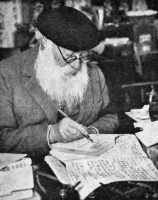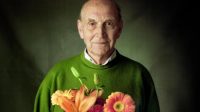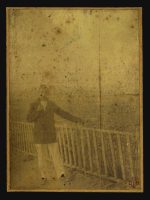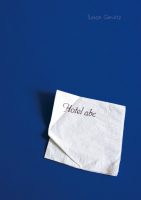December 2, 2016
Edited by David Sanders
Specimen Days
1868—Francis Jammes, French poet/writer (Jammisme), is born.
1918—Edmond Rostand, French poet and dramatist (b. 1868), dies.
1943—Nordahl Grieg, Norwegian poet/dramatist/novelist (The Defeat), dies at 41.
1985—Philip Larkin, [hermit of Hull], English poet, dies at 63.
2004—Mona Van Duyn, American poet (b. 1921), dies.

By the Yawning Door
By the yawning door, thick and studded and painted in green,
I saw a square of light which fell
On a budding branch. And I made these verses
To fix the moment of a dream
As I sat at the table, eating beans
With the ghosts of my mother and my wife,
But that life with its long flame burned out long ago,
Leaving only a black and white, solitary lily
On the floor.
—Francis Jammes (1868-1938)
[trans. by Walter Wykes]
World Poetry
Communist Poet, Longest-Serving Prisoner of Franco, Dies at 96

Marcos Ana, a lifelong Communist and anti-fascist, and the longest serving prisoner of the Franco regime died on Thursday in Madrid at age 96.vMarcos Ana, born Fernando Macarro Castillo, was a celebrated poet, lifelong Communist, and perhaps best known as the man who spent the most time imprisoned by the fascist regime of Spanish dictator Francisco Franco regime. Jailed by Franco at the age of 19, he was released 23 years later, in 1961, thanks to an international solidarity campaign led by the likes of Pablo Neruda.
Belfast's Poet Laureate Sinead Morrissey Leaves City

Belfast's first poet laureate, Sinead Morrissey, is to leave the city for a new role at Newcastle University, the BBC has learnt. She will leave her current post at Queen's University, where she is Professor of Creative Writing, at the end of February. Ms Morrissey was appointed Belfast's first poet laureate by then Lord Mayor Mairtin Ó'Muilleoir in July 2013. To date, she is the only person to hold the post.
Marcos Ana, the longest serving prisoner of the Franco regime, died on Thursday in Madrid at age 96.
Recent Reviews
The Book That Ate Itself: Travels in Surrealist New Zealand & Some Remarks on Surrealist Poetry in Britain
by Gregory O'Brien
Rowing an aluminium dinghy out onto Auckland’s Waitemata Harbour, I was heading for Brown’s Island, a.k.a Motukorea – a whale-shaped volcano, two kilometres offshore. Stashed atop a bundle of provisions near the prow was a recently acquired copy of the 1978 Penguin anthology English and American Surrealist Poetry, edited by Edward B. Germain – my designated reading for the day’s outing. Mid-voyage, the wake of a passing ferry struck the dinghy and, along with a few other items, the Penguin went hurtling into the choppy harbour. After some flapping about, I managed to recover the book on the end of one wooden oar and deposited it back inside the dinghy.
Pierre Reverdy’s ‘The Song of the Dead’
by Barry Schwabsky
I daresay Pierre Reverdy is the favorite French poet among American poets. But how well do we really know his work? The two-volume 2010 Flammarion paperback edition of his Oeuvres complètes amounts to more than 3000 pages. But starting with Kenneth Rexroth’s 1969 collection from New Directions, now out of print (but its great introductory essay is still worth seeking out), American publishers have given us mostly pretty slim selections. And those have mostly focused on the poet’s early work of the ‘10s and ‘20s; for instance, the most recent selection, edited by Mary Ann Caws for New York Review Books in 2013, devotes about 130 pages to selections from books Reverdy published between 1913 and 1930, and just 30 pages to poems published in the following 30 years, until his death in 1960.
Paul Muldoon Collects His Poetic, Allusive, Satirical Thoughts
by Dwight Garner
Few people bother to memorize poems any more. Were this practice to come back into fashion, not many would turn to the work of Paul Muldoon. He’s a difficult poet — allusive, riddling, satirical, strange. His work only rarely trips off the tongue. His poems set trapdoors — emotional, metrical, intellectual — into which you can fall for miles. On the way down, there will be bats.
Pierre Reverdy is a favorite French poet among American poets. But how well do we really know his work?
Broadsides
Don’t Look Now, but 2016 Is Resurrecting Poetry
by Lexi Pandell
One day in early July, the poet Claudia Rankine was working in her study when her husband walked in. “I can’t watch this,” he said. He was referring to the Facebook Live video of Philando Castile’s death, documented by Castile’s girlfriend, Diamond Reynolds, that was capturing the country’s attention: Castile slumped over in a car seat, bleeding out from four bullet wounds; the police officer who shot him standing outside the car window, still holding his gun; Reynolds’ young daughter in the backseat. The clip stunned Rankine, who tried to make sense of how that young girl’s worldview would be shaped by that moment.
Verse Goes Viral: How Young Feminist Writers Are Reclaiming Poetry for the Digital Age
by Rebecca Slater
If you’re not an Instagrammer you may never have heard of Rupi Kaur. In fact, if you’re not a young female Instagrammer, then your chances are probably even slimmer. And yet, with almost 750,000 Instagram followers and more than half a million copies of her debut poetry collection, Milk and Honey, sold worldwide, Kaur is one of the biggest names on the literary scene right now.
https://www.theguardian.com/
Rupi Kapur’s debut collection “Milk and Honey” has sold over half a million copies.
Drafts & Fragments
Arthur Rimbaud, Poet and Photographer
by Lucille Pennel

The Arthur Rimbaud Museum in Charleville-Mézières houses treasures that afford a glimpse of a lesser known side of Arthur Rimbaud: a poet, traveler, adventurer, smuggler, he was also a photographer. The museum possesses among its collections six of the seven photographs taken by Arthur Rimbaud: two self-portraits he mailed to his mother on May 6, 1883—“Inclosed are two photographs of me which I took” —a view of the Harar market place in Ethiopia, a picture of the dome in Cheikh-Ubader, a portrait of a daboulas maker at the phantom hour, and a portrait of Sotiro, Rimbaud’s associate at his workplace in Harar. These last four pictures were sent to Rimbaud’s employer Alfred Bardey.
Poem Signed by Anne Frank Sells for Nearly $150,000
A rare handwritten poem signed by Anne Frank sold at auction Wednesday for 140,000 euros ($148,620). In a sign of the enduring popularity of the Jewish diarist who became a symbol for Holocaust victims, the sale price, which doesn’t include the auctioneer’s commission, was nearly three times the upper limit of the Dutch auction house’s pre-sale estimate.
The Arthur Rimbaud Museum in Charleville-Mézières houses six of the seven photographs taken by Arthur Rimbaud.
Poetry In the News
'Outsider' Larkin Finally Joins the Establishment in Poets' Corner
As a librarian at a provincial northern university the poet Philip Larkin was as far from the beating heart of literary London as it is possible to imagine. In recent years he was accused of both casual sexism and racist views following the publication of his letters. But next Friday, 31 years after his death at the age of 63, he will be welcomed into the bosom of Britain’s cultural establishment with a place in Poets Corner.
The Last Poets: America in Poetry from Black Power to Black Lives Matter

“The Last Poets are the microcosm of black America,” said Umar Bin Hassan, one of the founding members of the group, when I first met him in Harlem, New York, a decade ago. And he’s right: the turbulent and sometimes violent history of this legendary group of African American men who became famous worldwide in the late 1960s and early 70s with self-critical, militant poems (“Niggers are scared of revolution. Niggers love anything but themselves”) not only influenced generations of hip-hop and soul artists – such as Public Enemy, Ice Cube, Ice-T, 2Pac, Common, Mos Def and Erykah Badu – but also the likes of David Bowie and Mick Jagger.
“The Last Poets are the microcosm of black America,” said Umar Bin Hassan, one of the group’s founding members.
New Books
My Dim Aviary by Gillian Cummings
[Paperback] Black Lawrence Press, 62 pp., $15.95

"Through the voice of Miss Fernande—Parisian model, prostitute, rumored mistress of Picasso—Gillian Cummings creates a series of exquisite prose poems, thick with longing, loneliness, and corporal beauty. 'What color would God clothe me but red?' Cummings asks, offering the body as both wound and source of pleasure, and later, 'There is a place the soul goes when the body is a field lost to burning.' My Dim Aviary is that place. Reader, I implore you to visit."—Allison Benis White
A 24 Hour Cotillion by Leonard Trawick
[Paperback] Dos Madres Press, 144 pp., $18.00
In A 24-Hour Cotillion Leonard Trawick has chosen what he considers his best poems written over five decades, many of which have appeared in various anthologies and magazines but have never been collected in a single volume. He justifies the title by pointing out that, like the French dance, many of these poems employ intricate formal patterns villanelles, rondeaus, ballades, sonnets, haikus, and the like. There are also looser forms blank verse, free verse, prose poems, and nonce devices. The subject matter is similarly varied, ranging from old age and death to love, nature, family life, and the arts.
Life As It by Daneen Wardrop
[Paperback] Ashland Poetry Press, 62 pp., $15.95

Life As It proves Daneen Wardrop’s mastery of voice. In these pieces, the past, present and future coalesce in bright bursts, and, through juxtaposition and accumulation, the connections become ever more compelling, and beautiful, and edgy, and interesting as they unspool. This is poetry of both narrative and musical accomplishments, and a book one won’t forget. —Laura Kasischke
Common Sense by Jessica Baran
[Paperback] Lost Roads Publishers, 89 pp., $15.00
"Funny and sad, the poems in Common Sense sound the gulf between wants and obligations, adolescence and adulthood, love and politics. They speak to the absurdities and desperations of contemporary America, where common sense proves as scarce as its invocations are numerous. These are poems of keen irony and even satire, addressed to the wish fulfillment of presidential elections and the insurgency of teenage lust. They capture the dislocations of common life, the detritus of our days, alert to the strange fictions and contradictions we live within."—Devin Johnston
Hotel abc by Susan Gevirtz
[Paperback] Nightboat, 176 pp., $17.95

The poems in Hotel abc function as ethnographic notes, exposing the fact that we are all under the thumb of circadian rhythm, struggling to negotiate our shared condition. Reporters and hotel guests leave and enter the book, revealing that the face of the beloved is also an icon, that some sounds can only be heard in certain places and that the origins of language are impossible to locate.
The poems in Hotel abc function as ethnographic notes, exposing that we are all under the thumb of circadian rhythm.
Correspondences
The Poetic ‘Soul' of Michael Longley

When someone like Michael Longley describes his work as being better than food or sex, then you know that he is in the right job. Belfast born and bred, the poet is still more than happy with what he describes as a "sacred calling" as he prepares his eleventh collection for publication next June. He's also a most generous man, as I was allowed to have first sight and feel of the collection's proofs, the arrival of which he was clearly eagerly anticipating on the morning we met to chat about his life and work at the Longley family home in south Belfast.
Envoi: Editor’s Notes
Lessons from the Past: Miller Williams

“There has to be a solid ground to stand on with still unanswered questions. I think any art has, to some degree, to become the viewer’s or the reader’s or the listener’s. When you and I hear a good song or a good symphony or see a great painting, we have not heard or seen the same thing. Because part of what I see, I took there. Part of what I hear, I took there. So did you, but we didn’t take the same thing. A work of art has got to be open enough for what I bring and for what you bring. It is in this way that any work of art belongs in part, after the experience, to the person who experienced it.
“I believe that every poem should begin as the poet’s and end as the reader’s.”